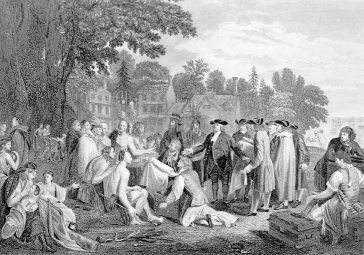

John Peter Zenger, a German immigrant who was also a printer and publisher (1735) was acquitted of
libel by a jury in the American colonies. The case is considered a milestone for freedom of the press in the Americas
James Oglethorpe ( June 9, 1732) his fellow trustees were granted a royal charter
for the Province of Georgia between the Savannah and Altamaha rivers
George Washington (February 22, 1732) was born at Popes Creek Plantation, on the
Potomac River southeast of modern-day Colonial Beach in Westmoreland County, Virginia
Dummer's War (1721-1725)
with the Treaty of Utrecht (April 1713) France ceded to Great Britain its claims to the Hudson Bay Company
territories in Rupert's Land, Newfoundland, and Acadia. France retained the Île-Saint-Jean (now Prince Edward
Island) and also Île Royale (now Cape Breton Island), upon which it erected the fortress of Louisbourg

Pennsylvania Colony (1681) was granted to William Penn in 1681 by King Charles II of England
René-Robert Cavelier,
Sieur de La Salle (1679, 1682) navigated the
Great Lakes by sailing ship and canoed down the Mississippi River
Louis Hennepin (1677) discovered the Niagara Falls
Bacon's Rebellion (1676)
the Carolina Colony (1665)
Dutch Governor Peter Stuyvesant surrenderd New Amsterdam (September 24, 1664) to
an English naval squadron commanded by Colonel Richard Nicolls who renamed it New York
New Jersey became a colony of England (March 12, 1664)
the United Colonies of New England (1643)
the Maryland Colony (1632)
the Massachusetts Bay Colony (1629) was established by the Puritans
Peter Minuit (May 24, 1626) purchased the island of Manhattan from
the Canarse Native Americans with trinkets valued at about $24
New England (1620-1788)
Plymouth Colony (1620) was founded by a group of people commonly known as the "Pilgrims"

the first Thanksgiving in America (December 4, 1619) was held in the Virginia Colony
New Netherland (1614-1674)

Rolfe married Pocahontas, daughter of the local Native American leader Chief Powhatan (1614)
John Rolfe became the first to commercially cultivate tobacco plants in North America (1611)
export of this sweeter tobacco beginning in 1612 helped turn the Virginia Colony into a profitable venture
Cuper's Cove (1610)

Captain John Smith
(May 13, 1607) established the first permanent English
settlement in North America the Virginia Colony at Jamestown
Popham Colony (1607) was a short-lived English colonial settlement in the
present-day town of Phippsburg, Maine near the mouth of the Kennebec River
the London Virginia Company (April 10, 1606) became incorporated as a joint stock company
Thomas Harriot's Brief and True Report of the New Found Land of Virginia (1588)
the Roanoke Colony in Virginia was the first English colony in the New World.(1587) (St. John's in
Newfoundland was claimed in 1583 by Humphrey Gilbert but no settlement was attempted)
The enterprise was financed and organized by Sir Walter Raleigh, who had received a charter
for the colonization of Virginia from Queen Elizabeth I of England, specifying that Raleigh had
ten years in which to establish a settlement in North America or lose his colonization rights
Queen Elizabeth I of England (end of the 16th century) (who was known as the "Virgin Queen" because she never married)
gave the name "Virginia" to the whole area explored by the 1584 expedition of Sir Walter Raleigh along the coast of North America

the first English colony (1583) was established at St. John's in Newfoundland by Sir Humphrey Gilbert